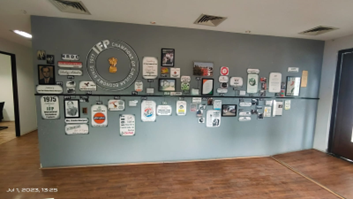ChEA BLOGS
Arush Gaur | IFP Petrochemicals

Hi, I am Arush Gaur,currently in my 3rd year in the chemical engineering department. My interest is mostly in research on sustainability and climate-change-related topics, which naturally interests me in the core chemical as well (ignoring the general grading and department image : D) since many applications of chemical engineering are useful in solving environmental problems. I will try my best to give a comprehensive review of my experience, but feel free to contact me for further details!
About the Internship
It was a 1.5-month internship. My office was alongside a small plant in Ghaziabad where they had equipment for distillation of used lubricant oil, viscosity enhancement, and a few other processes. Our main point of contact was the Strategy Head of the company and a few mentors who had experience in oil and gas-related processes. They were quite supportive and helpful, solving doubts and giving suggestions when asked.
I did my internship inIFP Petrochemicals,which is one of the first few oil enterprises in India that works on recycling used lubricant oil. Lubricants are a common substance in industries as well as automobiles. However, after long-term usage, they get contaminated with metallic impurities, oxidation products, and other forms of dirt. This makes them unusable for lubrication and they are generally disposed of (either they are directly disposed to the environment or burned as fuel). These disposal methods are harmful to the environment and in a way waste the used lubricant oil, increasing demand for fresh base oil, which puts pressure on oil refineries. A sustainable option that has emerged is recycling the used lubricant oil and converting it back to base lubricant oil, which can be reused. This cuts financial and energy costs, while also reducing environmental impact.
I was assigned the work of looking into the processes and giving suggestions on what new technology or engineering principles they can incorporate in their pilot plant (a new plant they are planning to establish). We visited their lab, looked at plant equipment, and did a literature review of processes like vacuum distillation, solvent extraction, hydrotreatment, etc.
My Sophomore Year
I have been interested in learning and working in sustainable processes, and especially how chemical engineering principles can be applied to them. This opportunity seemed appropriate as it combines these 2 areas into bringing a new process technology of lubricant oil recycling.
I had been pursuing a minor in Energy Science and Engineering as I wanted to get some exposure to existing renewable energy technologies.
I didn’t have any PoR in my second year, but I tried a few things related to my field of interest. I took part in Team Shunya’s trainee program where I learned about existing research and technology in sustainable housing. My experience in the section ‘Sustainable Social Development’ in NSS was also insightful. Apart from that, I had started a project that worked on climate data analysis but wasn’t able to make much progress in 2nd year, apart from the literature review.

Apping Process
Honestly, I hadn’t taken the process of intern apping seriously until the end of 4th semester ;(.
I have always been interested in doing a research internship, either with a professor from our institute or at IISc. However, hectic academics in 4th semester (and partly my procrastination lol) didn’t give me time to start apping. This intern opportunity came at the end of the 4th semester, after our end sem exams, so I applied for it.
Second-year internship is more about learning and getting exposure (be it to industry or research projects) rather than delivering new results for the company or earning a high stipend. It gives you a practical experience of the flavor of your domain of interest. Don’t hesitate to try new or unexplored areas in your second-year summer, since it’s the appropriate time to explore your interests, which can give insights into your future plans.
As for the process of getting a 2nd-year intern, I suggest trying a few things:
i) Start researching about companies (or projects/professors) at the start of your 4th semester at least. You can do it easily via LinkedIn, Internship blog, or department websites. Shortlist some companies/projects you have sufficient interest in, so that you can devote your summer to it. Then, start contacting the relevant people (HR/professors/etc) and discuss with them if they would be willing to hire summer interns, what they are working on, etc. Facing rejections is a common outcome, but don’t stop your applications; it will work out in the end.
ii)Talk to as many seniors as possible - DAMP/ISMP mentors, seniors from your hostel you know, or anyone else for that matter. They have had a lot of experience in projects and internships, and can definitely give you some guidance on how to go about the apping process.
iii) If you have a core or research interest, reach out to professors from your department. Generally, professors are quite interested in giving research work to UG students. Don’t let your regular acads or grades bother you in this, since research is very different from the conventional process of studies, quizzes, labs, exams, blah blah. Generally, research projects start at a simplistic level, with literature review or data analysis type work in the beginning. But if you are patient and work with good time commitment, the project often starts to get quite interesting and is like a new endeavor.
Many professors in the chemical department have great connections in industry and R&D as well, so they can help you get contacts in core industries. Don’t hesitate to mail professors and ask for help, they appreciate the enthusiasm of chemical students (probably for having sustained the interest despite their grading lol).
There are no set requirements for getting a 2nd year internship. Naturally, one doesn’t have sufficient prior experience by the end of 2nd year, apart from the standard academics. A 2nd year intern is mainly to get the first experience, learning from others and how they work. Despite this, you will likely have a vague idea of your field of interest. So the best way forward is to explore more opportunities there, from the Internet/LinkedIn, and talk with your seniors, professors, and classmates. It opens up your mind to various possibilities and helps you identify your targeted type of work.
Logistics
The company had a guesthouse accommodation and provided travel allowances, so the logistics weren’t much of a problem (although travel time was a total of about 90 minutes daily).
